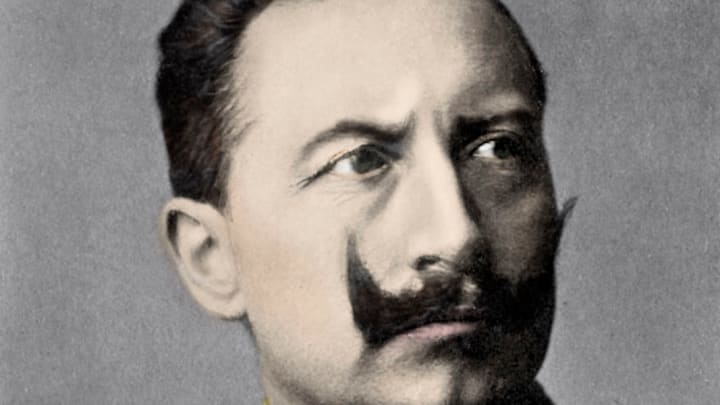While mustaches are now a matter of choice (and occasionally worn tongue-in-cheek), a century ago a man’s facial hair was serious business. Mustaches and beards conveyed virility, age, and experience, not to mention the personalities of their wearers. Of course, the best complement to meticulous facial barbering was an elaborate uniform replete with medals, ribbons, sashes, epaulettes, daggers, and other military accoutrements. Here are a few of the finest.
1. Franz Conrad von Hötzendorf

The belligerent head of Austria-Hungary’s army had equally belligerent facial hair. Like a Valkyrie’s wings, the upswept ends warn of terrible vengeance.
2. Wilhelm II

The mercurial German monarch Kaiser Wilhelm II encouraged Austria-Hungary to attack Serbia in 1914. Another case of the upswept Teutonic look.
3. Mahmud Shevket Pasha

One of many Ottoman Empire officials to be assassinated, Minister of War Mahmud Shevket Pasha was gunned down in Constantinople on June 11, 1913. A full beard afforded no protection.
4. Enver Pasha

The minister of war who led the Ottoman Empire into World War I in 1914, Enver Pasha was a great admirer of all things German, as reflected in his grooming choices.
5. Franz Josef I

By the start of World War I in 1914, Franz Josef had been emperor of Austria and king of Hungary for 66 years, and he had the sideburns to match.
6. Aleksandr Izvolsky

Russia’s ambassador to France, Count Aleksandr Izvolsky, was a Germanophobe who urged France to support Russia’s stand against Germany in July 1914. His mustache seconded the motion.
7. Alfred Redl

Redl was chief of Austrian military intelligence for years before being blackmailed into becoming a spy for Russia and then outed as gay, causing a scandal. After uncovering his treason, military officials suggested that Redl die by suicide, which he did.
8. George I

George I was a Danish prince who became king of Greece in 1863. He was assassinated in Salonika in March 1913. This portrait enshrines his flying handlebar mustache for posterity.
A version of this story was published in 2013; it has been updated for 2023.
